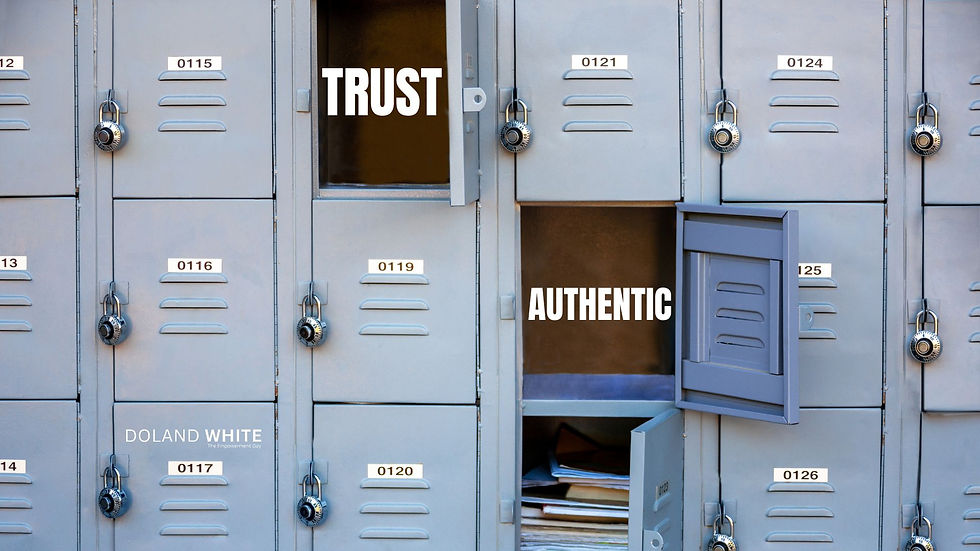The Leadership Playbook: Building Trust Through Authentic Marketing
- Doland White

- Nov 20, 2024
- 3 min read
Updated: Mar 10

As leaders, we often focus on the how of marketing—but do we spend enough time on the why?
In this post, we'll unpack some powerful lessons on authentic marketing shared by Brian and Lindsay Schlick, founders of Schlick Art, during their conversation on The Next Interview. We explore how aligning marketing with core values builds trust, why a fractional CMO can drive strategic growth, and the importance of creating a sustainable marketing plan to avoid last-minute panic decisions.
Key Takeaways
Trust & Autonomy: Authenticity in marketing builds lasting trust with your clients.
Communication & Transparency: Consistent messaging aligned with core values enhances client engagement.
Growth & Innovation: Leveraging a fractional CMO can drive growth while reducing costs.
Systems of Accountability: A well-planned, sustainable marketing strategy helps avoid reactive, panic-driven decisions.
The Power of Authentic Marketing in Leadership
Marketing is more than just a tactic—it's a way to build trust. Brian and Lindsay emphasized that true authenticity isn't just about appearing genuine; it's about aligning your marketing messages with your company's core values. Leaders who focus on this alignment create loyal clients and foster a high-trust culture within their teams.
Actionable Tip: Revisit your core values before launching your next marketing campaign. Ensure every message aligns with the principles you stand by. Authenticity is key to creating lasting client relationships.
Leveraging a Fractional CMO for Strategic Growth
As companies scale, marketing needs become more complex. However, not every organization can afford a full-time Chief Marketing Officer. This is where a fractional CMO comes in. Brian and Lindsay explained how fractional leadership can provide the expertise you need without the overhead costs of a full-time executive.
A fractional CMO can assess your marketing strategy, bring fresh perspectives, and optimize campaigns. This allows business leaders to focus on their strengths while ensuring their marketing efforts are aligned with strategic goals.
Actionable Tip: If your marketing team feels overwhelmed or lacks strategic direction, consider bringing in a fractional CMO. It's a cost-effective way to boost your marketing without the burden of a full-time salary.
Moving from Reactive to Proactive: Building a Sustainable Marketing Strategy
Many leaders approach marketing reactively—often in response to an urgent need. But this approach can lead to "shiny object syndrome," where immediate pressures rather than long-term goals drive decisions. Brian and Lindsay advocate for a proactive strategy that aligns marketing with your company's broader vision.
They emphasize that a well-thought-out strategy not only drives consistent results but also reduces stress for teams. By planning ahead, leaders can avoid the chaos of last-minute marketing efforts and focus on sustainable growth.
Actionable Tip: Set aside time each quarter to review your marketing strategy. Focus on long-term goals rather than short-term fixes to maintain consistency and avoid reactive decisions.
Real-World Example
Brian and Lindsay shared an example of working with a financial institution whose VP of Marketing needed more resources. By stepping in as fractional CMOs, they helped the VP strategize and execute a plan that aligned with the company's growth goals. This led to increased client engagement and a clearer path for scaling their marketing efforts.
Key Action Steps
For Trust & Autonomy: Regularly audit your marketing messages to ensure they align with your core values.
For Communication & Transparency: Foster open dialogue with your marketing team and clients to ensure consistent, clear messaging.
For Growth & Innovation: Explore fractional leadership roles to bring in expertise without the full-time commitment.
For Systems of Accountability: Establish quarterly marketing reviews to track progress and adjust strategies as needed.
Conclusion
Effective leadership in marketing is about more than just generating leads—it's about fostering trust and credibility. Leaders who prioritize authenticity, leverage the power of fractional expertise, and build sustainable strategies will see lasting success.



Comments